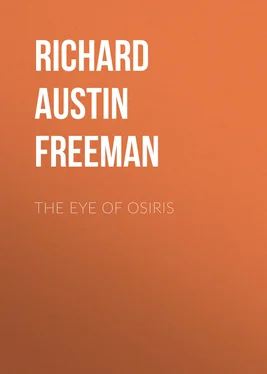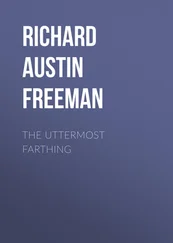Richard Austin Freeman - The Eye of Osiris
Здесь есть возможность читать онлайн «Richard Austin Freeman - The Eye of Osiris» — ознакомительный отрывок электронной книги совершенно бесплатно, а после прочтения отрывка купить полную версию. В некоторых случаях можно слушать аудио, скачать через торрент в формате fb2 и присутствует краткое содержание. Жанр: foreign_prose, Классический детектив, foreign_detective, foreign_antique, на английском языке. Описание произведения, (предисловие) а так же отзывы посетителей доступны на портале библиотеки ЛибКат.
- Название:The Eye of Osiris
- Автор:
- Жанр:
- Год:неизвестен
- ISBN:нет данных
- Рейтинг книги:4 / 5. Голосов: 1
-
Избранное:Добавить в избранное
- Отзывы:
-
Ваша оценка:
- 80
- 1
- 2
- 3
- 4
- 5
The Eye of Osiris: краткое содержание, описание и аннотация
Предлагаем к чтению аннотацию, описание, краткое содержание или предисловие (зависит от того, что написал сам автор книги «The Eye of Osiris»). Если вы не нашли необходимую информацию о книге — напишите в комментариях, мы постараемся отыскать её.
The Eye of Osiris — читать онлайн ознакомительный отрывок
Ниже представлен текст книги, разбитый по страницам. Система сохранения места последней прочитанной страницы, позволяет с удобством читать онлайн бесплатно книгу «The Eye of Osiris», без необходимости каждый раз заново искать на чём Вы остановились. Поставьте закладку, и сможете в любой момент перейти на страницу, на которой закончили чтение.
Интервал:
Закладка:
I bought a copy of the paper, and, tucking it under my arm, hurried on to the surgery, promising myself a mental feast of watercress; but as I opened the door I found myself confronted by a corpulent woman of piebald and pimply aspect who saluted me with a deep groan. It was the lady from the coal shop in Fleur-de-Lys Court.
"Good evening, Mrs. Jablett," I said briskly; "not come about yourself, I hope."
"Yes, I have," she answered, rising and following me gloomily into the consulting-room; and then, when I had seated her in the patient's chair and myself at the writing table, she continued: "It's my inside, you know, doctor."
The statement lacked anatomical precision and merely excluded the domain of the skin specialist. I accordingly waited for enlightenment and speculated on the watercress-beds, while Mrs. Jablett regarded me expectantly with a dim and watery eye.
"Ah!" I said at length; "it's your—your inside, is it, Mrs. Jablett?"
"Yus. And my 'ead," she added, with a voluminous sigh that filled the apartment with odorous reminiscences of "unsweetened."
"Your head aches, does it?"
"Somethink chronic!" said Mrs. Jablett. "Feels as if it was a-opening and a-shutting, a-opening and a-shutting, and when I sit down I feel as if I should bust ."
This picturesque description of her sensations—not wholly inconsistent with her figure—gave the clue to Mrs. Jablett's sufferings. Resisting a frivolous impulse to reassure her as to the elasticity of the human integument, I considered her case in exhaustive detail, coasting delicately round the subject of "unsweetened" and finally sent her away, revived in spirits and grasping a bottle of Mist. Sodae cum Bismutho from Barnard's big stock-jar. Then I went back to investigate the Horrible Discovery; but before I could open the paper, another patient arrived ( Impetigo contagiosa , this time, affecting the "wide and arched-front sublime" of a juvenile Fetter Laner), and then yet another, and so on through the evening until at last I forgot the watercress-beds altogether. It was only when I had purified myself from the evening consultations with hot water and a nail-brush and was about to sit down to a frugal supper, that I remembered the newspaper and fetched it from the drawer of the consulting-room table, where it had been hastily thrust out of sight. I folded it into a convenient form, and, standing it upright against the water-jug, read the report at my ease as I supped.
There was plenty of it. Evidently the reporter had regarded it as a "scoop," and the editor had backed him up with ample space and hair-raising head-lines.
"A startling discovery was made yesterday afternoon in the course of clearing out a watercress-bed near the erstwhile rural village of Sidcup in Kent; a discovery that will occasion many a disagreeable qualm to those persons who have been in the habit of regaling themselves with this refreshing esculent. But before proceeding to a description of the circumstances of the actual discovery or of the objects found—which, however, it may be stated at once, are nothing more or less than the fragments of a dismembered human body—it will be interesting to trace the remarkable chain of coincidences by virtue of which the discovery was made.
"The beds in question have been laid out in a small artificial lake fed by a tiny streamlet which forms one of the numerous tributaries of the River Cray. Its depth is greater than usual in the watercress-beds, otherwise the gruesome relics could never have been concealed beneath its surface, and the flow of water through it, though continuous is slow. The tributary streamlet meanders through a succession of pasture meadows, in one of which the beds themselves are situated, and here throughout most of the year the fleecy victims of the human carnivore carry on the industry of converting grass into mutton. Now it happened some years ago that the sheep frequenting these pastures became affected with the disease known as 'liver-rot'; and here we must make a short digression into the domain of pathology.
"'Liver-rot' is a disease of quite romantic antecedents. Its cause is a small, flat worm—the liver-fluke—which infests the liver and bile-ducts of the affected sheep.
"Now how does the worm get into the sheep's liver? That is where the romance comes in. Let us see.
"The cycle of transformation begins with the deposit of the eggs of the fluke in some shallow stream or ditch running through pasture lands. Now each egg has a sort of lid, which presently opens and lets out a minute, hairy creature who swims away in search of a particular kind of water-snail—the kind called by naturalists Limnoea truncatula . If he finds a snail, he bores his way into its flesh and soon begins to grow and wax fat. Then he brings forth a family—of tiny worms quite unlike himself, little creatures called rediae , which soon give birth to families of young rediae . So they go on for several generations, but at last there comes a generation of rediae which, instead of giving birth to fresh rediae , produce families of totally different offspring; big-headed, long-tailed creatures like miniature tadpoles, called by the learned cercariae . The cercariae soon wriggle their way out of the body of the snail, and then complications arise: for it is the habit of this particular snail to leave the water occasionally and take a stroll in the fields. Thus the cercariae , escaping from the snail find themselves on the grass whereupon they promptly drop their tails and stick themselves to the grass-blades. Then comes the unsuspecting sheep to take his frugal meal, and, cropping the grass swallows it, cercariae and all. But the latter, when they find themselves in the sheep's stomach, make their way straight to the bile-ducts, up which they travel to the liver. Here, in a few weeks, they grow up into full-blown flukes and begin the important business of producing eggs.
"Such is the pathological romance of the 'liver-rot'; and now what is its connection with this mysterious discovery? It is this. After the outbreak of 'liver-rot' above referred to, the ground landlord, a Mr. John Bellingham, instructed his solicitor to insert a clause in the lease of the beds directing that the latter should be periodically cleared and examined by an expert to make sure that they were free from the noxious water-snails. The last lease expired about two years ago, and since then the beds have been out of cultivation; but, for the safety of the adjacent pastures, it was considered necessary to make the customary periodical inspection, and it was in the course of cleaning the beds for this purpose that the present discovery was made.
"The operation began two days ago. A gang of three men proceeded systematically to grub up the plants and collect the multitudes of water-snails that they might be examined by the expert to see if any obnoxious species were present. They had cleared nearly half of the beds when, yesterday afternoon, one of the men working in the deepest part came upon some bones, the appearance of which excited his suspicion. Thereupon he called his mates, and they carefully picked away the plants piece-meal, a process that soon laid bare an unmistakable human hand lying on the mud amongst the roots. Fortunately they had the wisdom not to disturb the remains, but at once sent off a message to the police. Very soon, an inspector and a sergeant, accompanied by the divisional surgeon, arrived on the scene, and were able to view the remains lying as they had been found. And now another very strange fact came to light; for it was seen that the hand—a left one—lying on the mud was minus its third finger. This is regarded by the police as a very important fact as bearing on the question of identification, seeing that the number of persons having the third finger of the left hand missing must be quite small. After a thorough examination on the spot, the bones were carefully collected and conveyed to the mortuary, where they now lie awaiting further inquiries.
Читать дальшеИнтервал:
Закладка:
Похожие книги на «The Eye of Osiris»
Представляем Вашему вниманию похожие книги на «The Eye of Osiris» списком для выбора. Мы отобрали схожую по названию и смыслу литературу в надежде предоставить читателям больше вариантов отыскать новые, интересные, ещё непрочитанные произведения.
Обсуждение, отзывы о книге «The Eye of Osiris» и просто собственные мнения читателей. Оставьте ваши комментарии, напишите, что Вы думаете о произведении, его смысле или главных героях. Укажите что конкретно понравилось, а что нет, и почему Вы так считаете.











